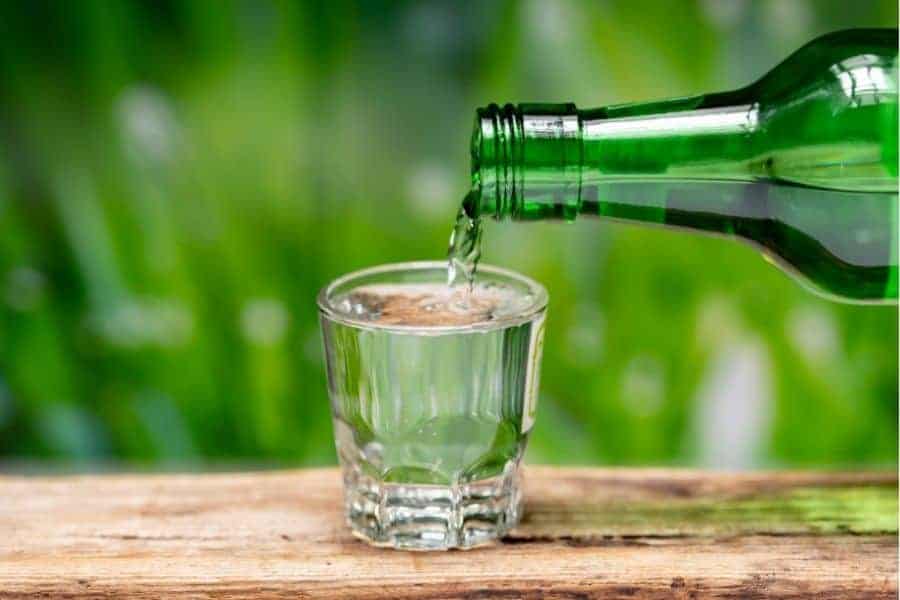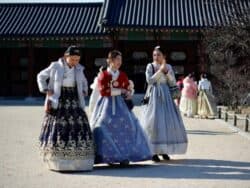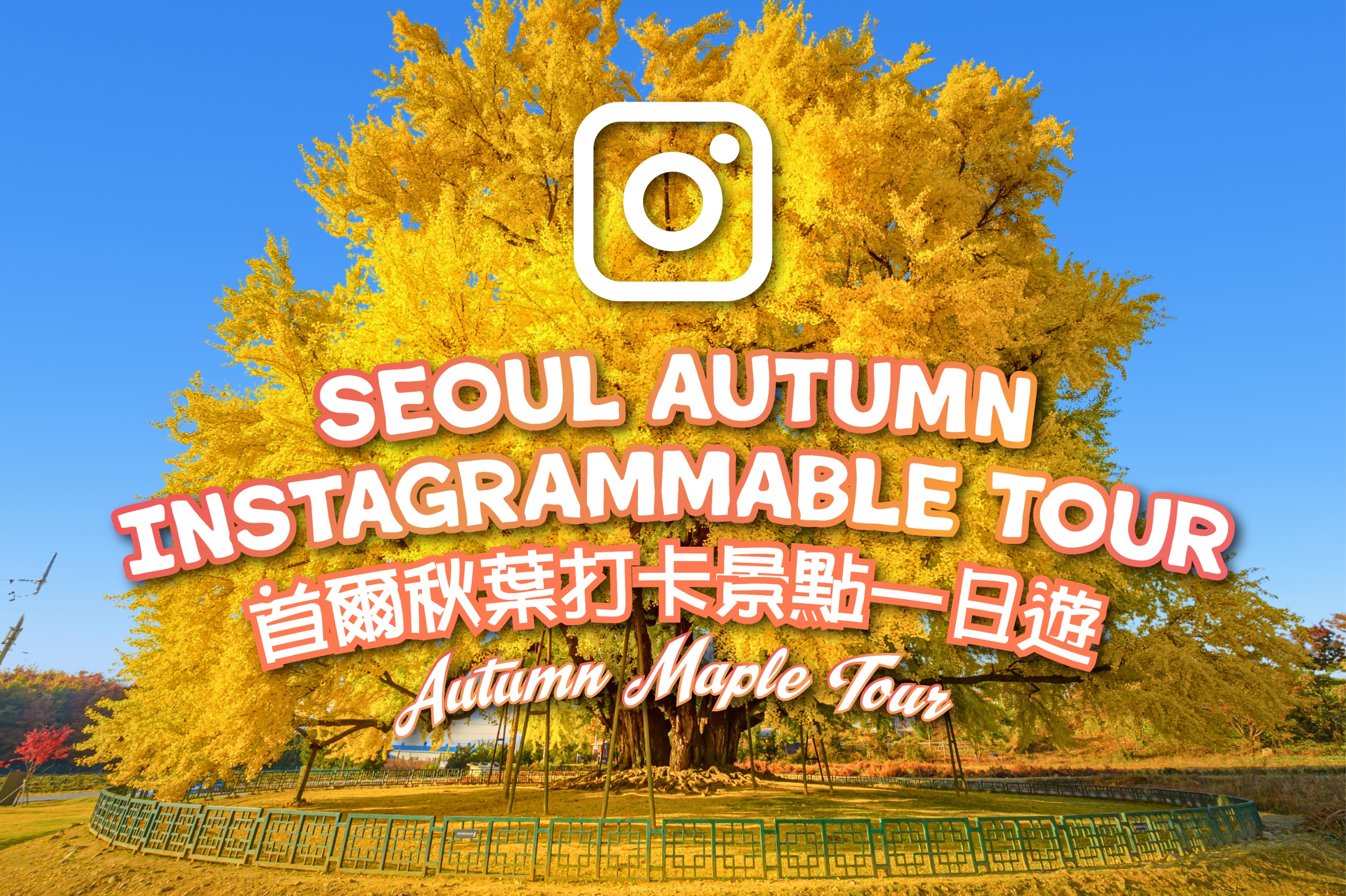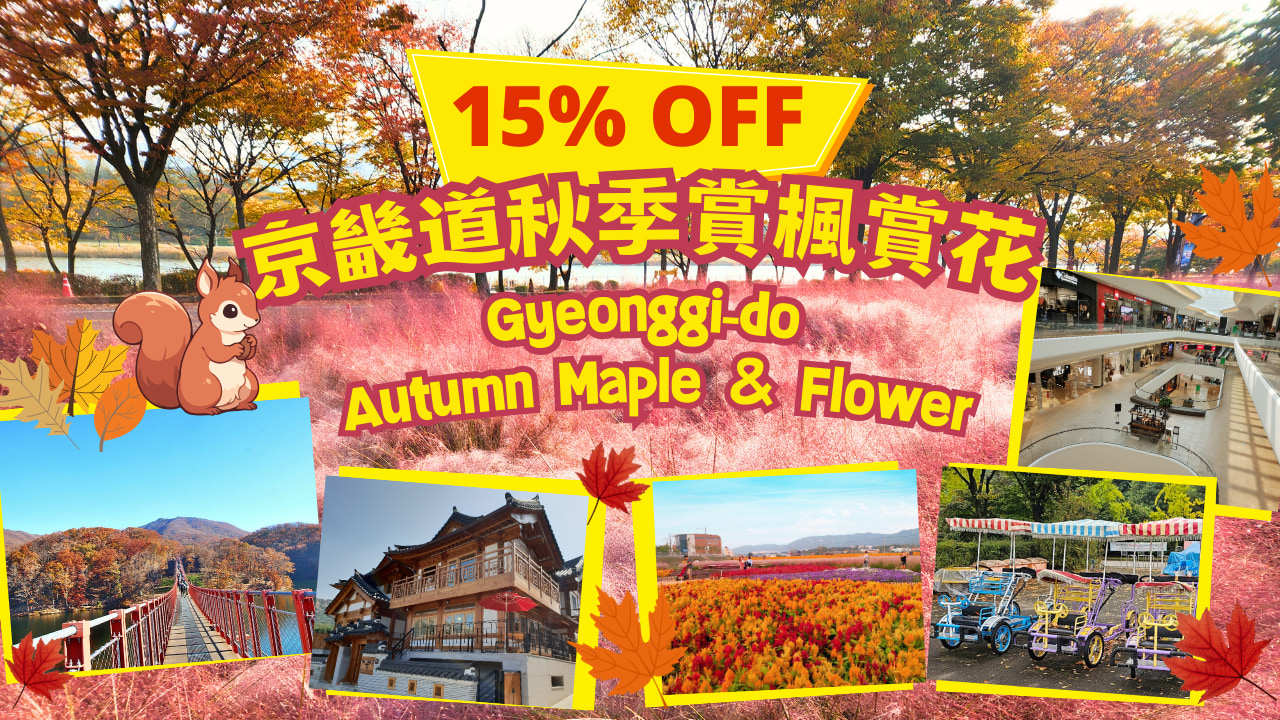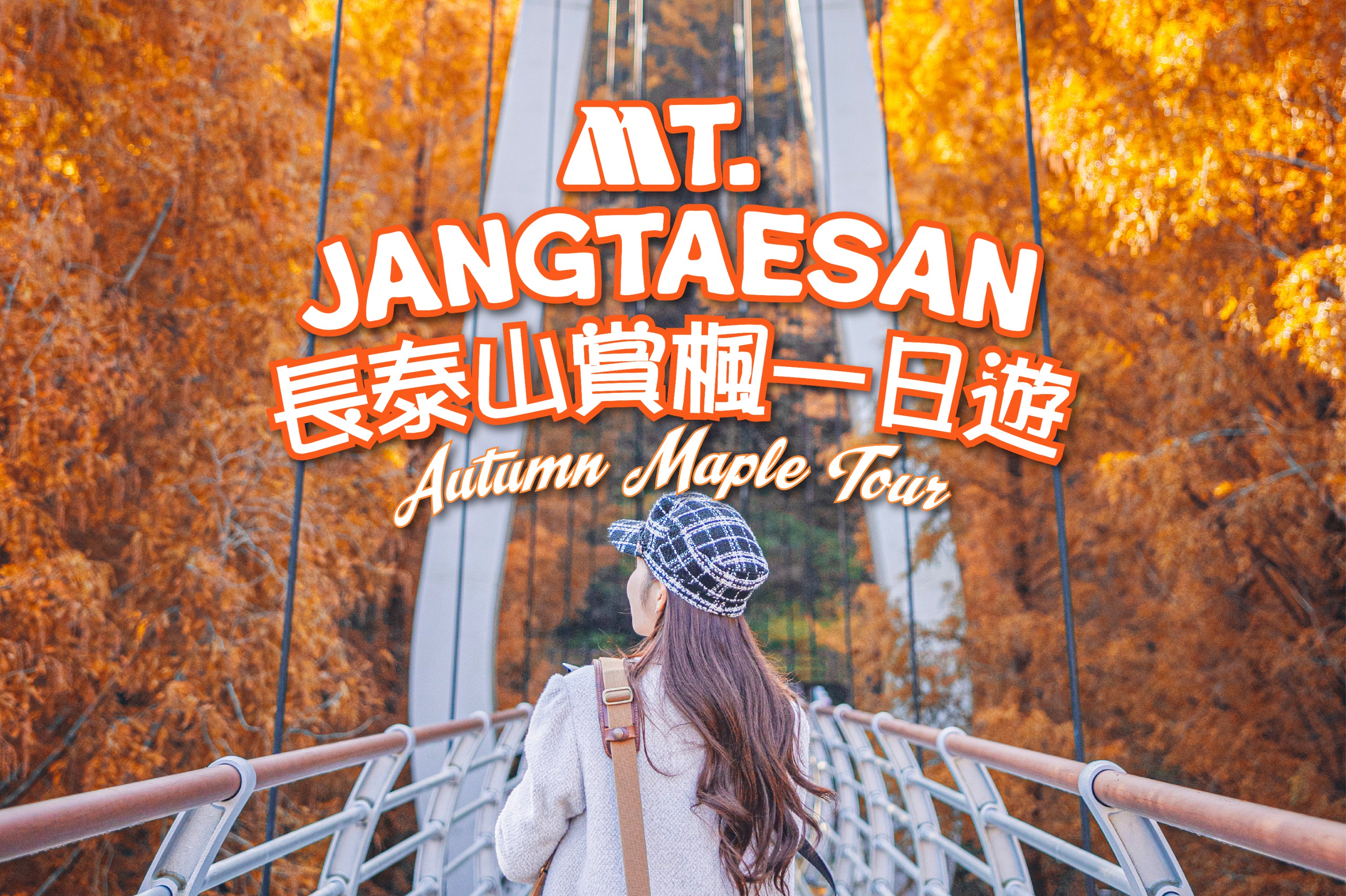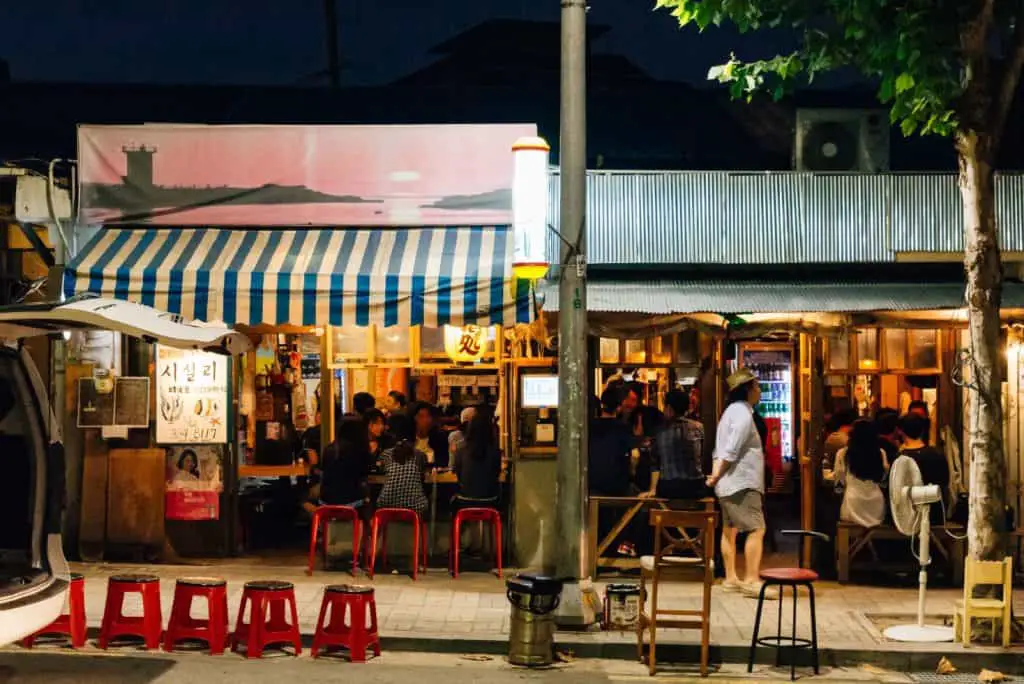When it comes to Korea’s alcoholic liquors and beverages, there are many to choose from. In fact, drinking has become a significant part of Korean culture over the course of centuries. While not everyone indulges in the devil’s drink, it’s obvious that drinking is pervasive in many aspects of society, and it’s easy to find certain types of alcoholic drinks and beverages. This article lists the most famous traditional Korean liquors, including but not limited to makgeolli and soju.
All of these have origins tracing back to before the time of The Three Kingdoms of Korea, and even before that. What a lot of them have in common is that they are made with rice. It must be noted, however, that “rice wine” doesn’t define any of these drinks exactly.
Best Traditional Korean Liquors
Types of Traditional Korean Liquors
Makgeolli (Takju)
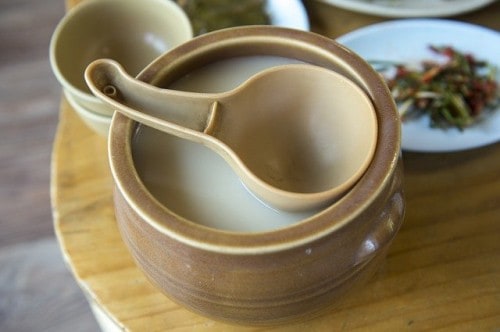
Makgeolli is perhaps the second most well-known Korean liquor after soju. It is also the most famous Korean rice wine. Makgeolli is made with rice. Makgeolli is in fact one of Korea’s oldest rice wines; the first mention of it being in the Poetic Records of Emperors and Kings and specifically in the founding story of King Dongmyeong. With a pretty low alcoholic percentage (between 6 and 13 percent), makgeolli has a milky taste. If you know what Yakult tastes like, makgeolli to me tastes similar.
The process of creating makgeolli has two steps: seed mash and fermentation. Nuruk (cereal that has the enzymes necessary for yeast growth) is mixed with yeast. Then, the mix ferments for up to about a week. If you’ve ever smelled a bottle or bowl of makgeolli, you would pick up a slightly floral, aromatic smell that comes from the nutrients and amino acids from the rice.
As of recently, alcohol companies have produced and distributed different flavors of makgeolli. Among these flavors are yuja (citron), ginseng, omija (five-flavor berry), pine nut, banana, strawberry, and blueberry. The last three, while not all the fruit flavor options are less traditional and more modern, appealing to more of the population.
Like soju, you can find makgeolli anywhere, although it has a heftier price tag than soju. Here, you can find a list of makgeolli bars in Seoul.
Makgeolli Festival
In Korea, makgeolli is such an important drink that people have started celebrating the traditional liquor during celebrations and festivals. The purpose of said festivals is to promote makgeolli domestically and internationally. The festivals also inform customers of all the ways that makgeolli can be enjoyed; at these festivals, there will be a designated camping site where people can spend a night or two, enjoying the provided meal and makgeolli set. The bottles of makgeolli would be of different flavors, giving everyone something to enjoy! They will also earn insight on what kind of food pairs well with their favorite makgeolli drink. The most popular one is the Jaraseom Makgeolli Festival held every year. Currently, due to covid-19, it is on hold. You can check their website for more information in the future.
Cheongju(Yakju)
The process of making cheongju is very similar to that of makgeolli; in fact, the essence of what cheongju is is the clear liquid that straining makgeolli leaves behind. With a name that literally means “clear color alcohol,” cheongju is genuine and well-prepared alcohol. For this reason, cheongju is used in many traditional rituals and ceremonies. People believe that the oldest cheonju dates back to 1,500 years ago.
Soju
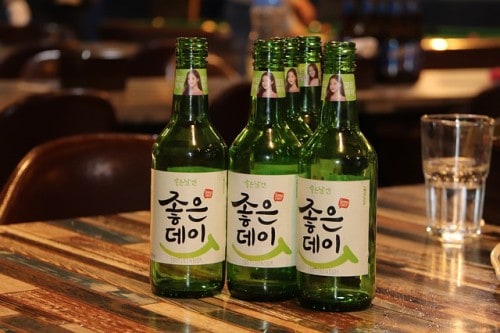
When you think of traditional Korean liquors, soju is probably the first one that crosses your mind. Indeed, you can find it at every restaurant, bar, club, and convenience store at a very low price between ₩1,000–₩2,000 ($0.80 –$1.80). Originating from the Mongols who in turn, took inspiration from the Persians in the 13th Century, soju is the alcoholic beverage of choice at any social gatherings and work dinners, and to me, it is truly the drink that’s connotated with Korean social life. Typically, people can make soju with grains (rice, wheat, barley) or starch (potatoes, sweet potatoes). While many people compare soju to the Russian liquor vodka, soju has a sweeter taste due to the added sugar.
Jinro is the largest manufacturer of soju and it accounts for more than half of all white spirits sold in and out of South Korea. Out of all the alcohol Jinro produces and sells, soju makes up for 97% of the category.
Fruit Wines (gwasilju)
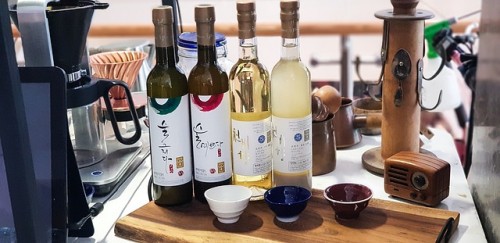
Gwasilju is a name that describes any Korean fruit wines; as the name suggests, alcoholic brewers make these using fruit, either by fermenting them or mixing them with sugar and alcohol. Because of their fruity aromas, sweetness, and low alcoholic content, gwasilju drinks are popular with men and women, and some Korean families would even make their own gwasilju by mixing fermented fruit with soju or cheongju.
You might have seen two of Korea’s fruit wines, bokbunjaju and maesilju. Bokbunjaju is a fruit wine made with blackberries (bokbunja being Korean black berries), while maesilju is a fruit wine made with plum (maesil being Korean plum). There are several other fruit wines that one can find anywhere, although gwasilju are pricier than other kinds of alcohol.
A bottle of bokbunjaju can be between ₩15,000 and ₩50,000.
Beer (maekju)
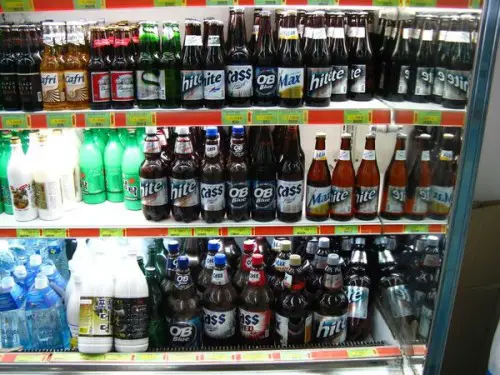
Although not a strictly traditional drink, maekju (“beer” in Korean) is a widely drunk alcoholic beverage. You can find beer anywhere ranging from convenience stores to upscale restaurants. Thanks to the increasing globalization in Korea, alcohol companies have imported beers hailing from other countries. For example, in Seoul’s Mexican restaurants, you are sure to find Mexican beer brands Corona. In Chinese establishments, you will find Tsingdao. Heineken is another domestic beer brand popular in Korea.
Korea also has domestic beer brands, monopolized by five large alcohol companies. Popular beer brands include Hite, Cass, and OB Golden Liger.
Have you heard of Chimaek (Chicken & Beer)? The favorite food and drink combination of many Korean. Our articles give a lay of the land of Chimaek.
Where To Buy Korean Alcoholic Beverages in Korea?
As mentioned before, soju and makgeolli are commonplace and can be found anywhere; You can find these alcoholic beverages at restaurants, bars, clubs, clubs, convenience stores, and individual Korean homes. The convenience stores in Seoul are everywhere. Since there is at least one on every block, there’s always one easily accessible to you, no matter where you are.
There are a handful of prolific and easily accessible convenience store franchises. The most famous of these are GS25, CU, 7-11, and E-Mart 24. Besides various food and drink items, Korean convenience stores also sell stationery, electronics, and even toiletries. You can also come and charge your public transportation card at the cashier and mail packages to any domestic address, right from the confines of the convenience store!
But of course, this article is about soju and makgeolli, so we must talk about the collection of alcoholic beverages that every convenience store has.
For more information on the convenience stores in Korea, our article on the topic offers insights, tips, and tricks that you can employ right away!
Supermarkets include Homeplus, LotteMart, and E-Mart. For a more in-depth look at each, we have a great article that will guide you with the different options.
If you’re staying in Seoul for more than one day and one night, there’s no reason not to explore all that Korean culture has to offer, and that includes the Korean drinking culture. Seoul is a desired destination for hundreds of people for a myriad of reasons. Those who drink and have partied with locals on the streets of Hongdae and Itaewon always go back for more! With a varied collection of alcoholic drinks and alcoholic liquors, you are sure to find something that you fall in love with!
You may also like,
- Korean Barbecue Restaurants and Menu Recommendation
- Best Korean Restaurants in Hongdae
- Best Korean Restaurants in Gangnam
- How To Order Delivery Foods in Korea
- Seoul Itinerary and Attractions
IVK’s Top Picks – Day Tours, Tickets, and Travel Activities
Seasonal Picks!😍


